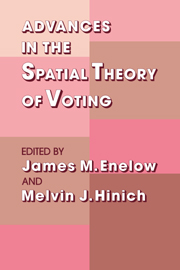
-
Select format
-
- Publisher:
- Cambridge University Press
- Publication date:
- March 2012
- June 1990
- ISBN:
- 9780511896606
- 9780521352840
- 9780521084536
- Dimensions:
- (228 x 152 mm)
- Weight & Pages:
- 0.475kg, 256 Pages
- Dimensions:
- (228 x 152 mm)
- Weight & Pages:
- 0.4kg, 260 Pages
You may already have access via personal or institutional login
Book description
This volume brings together eight original essays selected to provide an overview of the developments in the spatial theory of voting. The spatial theory of self-interest and explores the consequences of this assumption for elite behaviour and for the choices voters make in representative and direct democracies. The book summarizes work in eight major areas: elections with possible entry by new candidates who have policy preferences, experimental testing of spatial models of committees and elections, elections with imperfect information about voting intentions, voting on alternatives that are linked to future decisions, elections with candidates who have policy preferences, experimental testing of spatial manoeuvres designed to alter voting outcomes, elections with experimental testing of spatial models of committees and elections, elections with imperfect information about voting intentions, voting on alternatives that are linked to future decisions, elections with more than two candidates under different election rules, and bureaucratic efforts to manipulate referendum voting. Recognized scholars in these areas summarize the major results of their own and others' work, providing self-contained discussions that will apprise readers of important recent advances.
Reviews
"This is a first-rate collection useful to students, practitioners, and critics." George Rabinowitz, Contemporary Sociology
Contents
Metrics
Full text views
Full text views help Loading metrics...
Loading metrics...
* Views captured on Cambridge Core between #date#. This data will be updated every 24 hours.
Usage data cannot currently be displayed.
Accessibility standard: Unknown
Why this information is here
This section outlines the accessibility features of this content - including support for screen readers, full keyboard navigation and high-contrast display options. This may not be relevant for you.
Accessibility Information
Accessibility compliance for the PDF of this book is currently unknown and may be updated in the future.


